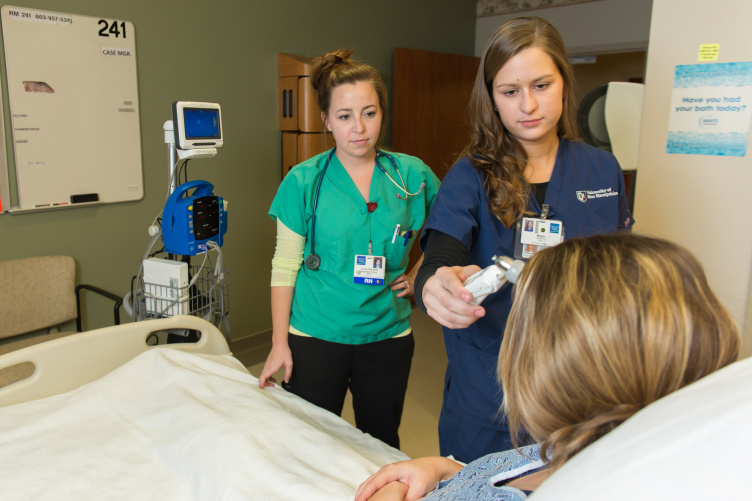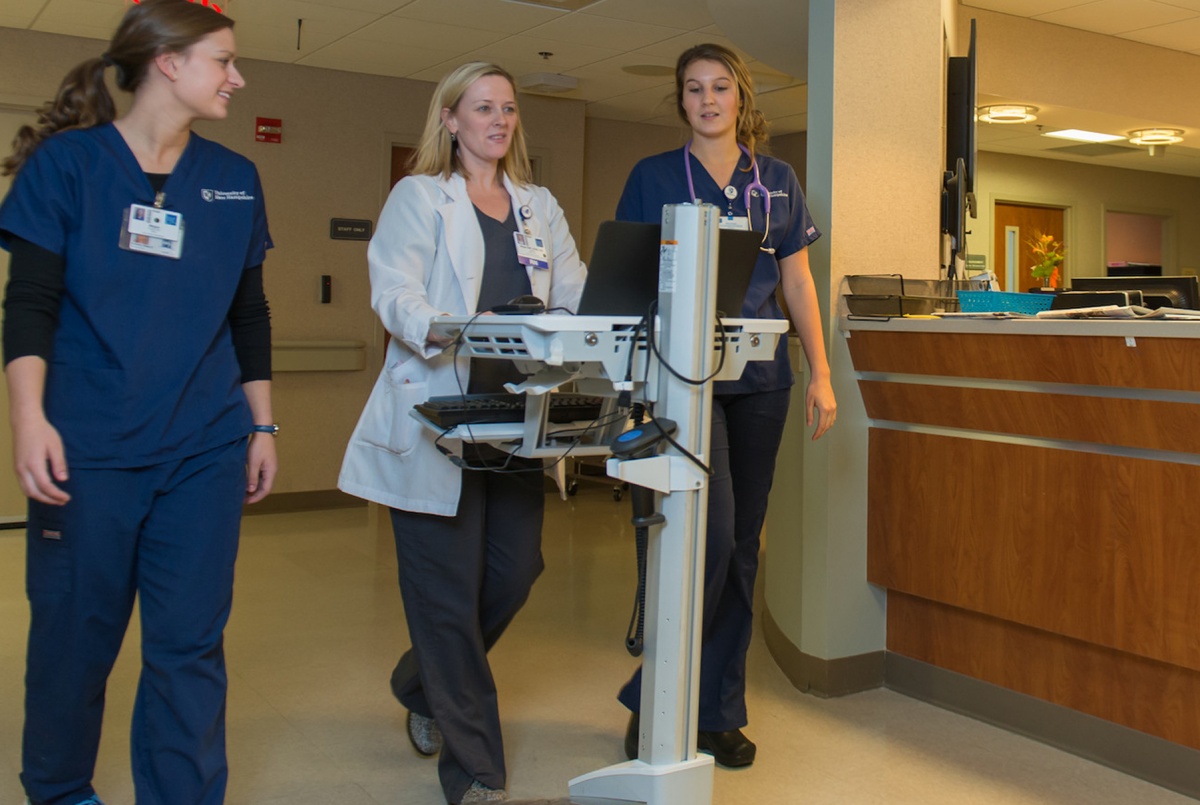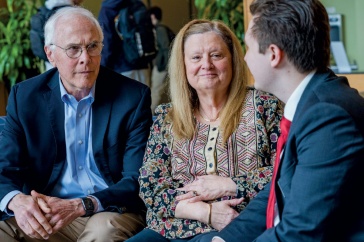
Nurse Sarah St. Pierre (left) supervises UNH nursing student Megan Howland in a patient room at Portsmouth Regional Hospital.
The department of nursing may be celebrating its 50th anniversary this year, but it is hardly resting on its laurels. It is at the forefront of preparing tomorrow's nurses, with a first-in-the-state nursing education program — a dedicated education unit (DEU) that pairs UNH students with Portsmouth Regional Hospital (PRH) nurses toward a more holistic approach to nursing where students “feel more like a nurse than a nursing student,” professor Susan Fetzer explains.
In the spring of 2014, the department applied to the Board of Nursing to begin its first DEU program for eight students that fall. Such programs were first introduced in Australia in 1999 and have been in place in the United States for more than 10 years now. The program is based on collaboration between nursing education and nursing practice where “a selected staff nurse works with a student throughout the semester clinical rotation,” Fetzer explains. That staff nurse or nurse preceptor is the student’s primary clinical teacher, providing direct supervision, while academic faculty works with staff nurses to support their clinical teaching, help transfer classroom learning and ensure students are achieving the expected learning outcomes.
Megan Gray, director of Critical Care IMCU/IVCU at Portsmouth Regional Hospital and adjunct professor, who oversees the program at PRH, explains, “The most important things the students are gaining is, one, a real picture of what nursing is and, two, increasing their confidence.”

Director of critical care IMCU/IVCU Megan Gray (center) and UNH nursing students Megan Howland (left) and Shannon Cardinal make their rounds at Portsmouth Regional Hospital. Gray is an adjunct faculty member in the UNH College of Health and Human Services, home to the nursing program.
Charles Adler ’16 and Sofia Carapeta ’16 were in the pilot program during the 2014-2015 academic year.
Adler says the experience “accelerated my clinical confidence in providing quality care to patients,” adding the professional relationship he developed with his nurse mentor “resulted in an improved ability to provide advanced nursing assessments, clinical thinking strategies and patient-centered care.”
Carapeta agrees, describing the “realistic picture of nursing” the program provides: “I learned how to prioritize assessments, how to time manage with a full patient workload, how to be organized, how to stay calm in times of stress and how important communication is between staff.”
This year, the program has grown to include 12 students, and several of them describe similar experiences to Adler and Carapeta.
“In a typical clinical, students are assigned only one patient to care for; however, time management and prioritization is a huge part of nursing. In the DEU program, I practice these skills by managing a full patient load with my preceptor,” explains Joanna Foos ’17, adding, “Working with the same nurse every week has allowed us to develop a relationship. She knows my strengths, weaknesses and where I need to improve in order to become an effective nurse.”
Kristyn Gallant ’17 agrees, describing how the program’s structure allows students to immerse themselves: “We take on the workload and patient assignments of a nurse; however, we do so with continuous one-on-one support and guidance.”
Shannon Cardinal ’17 notes, “Every clinical day, I am learning something new and incorporating my knowledge in the classroom with my practice. I'm making active contributions to my patients’ care and offering my opinions and perceptions. I feel the DEU program allows me to flourish, grow, question and develop as a student nurse — something that boosts my confidence, practice and care.”

Gray says having the students at the hospital has increased “our nurses’ eagerness to grow themselves as professionals and as teachers and role models. Teaching really holds us all accountable to our best practices. Both UNH and PRH benefit from it.”
“Overall, this program has made me more knowledgeable as well as confident in my ability to become a nurse,” Gallant says, and Cardinal adds that the program also has positive implications for “the patients who will one day be influenced by our care.”
As Carapeta puts it, in addition to gaining hands-on skills and practical knowledge, “By helping to care for patients with a variety of diagnoses, I feel better equipped to handle the array of situations I will continue to come across. This experience helped affirm what a vital and essential role that nurses have. I believe that I'll be a better nurse because of my experience with the DEU, and for that I'll always be grateful.”
Adler agrees.
“It was incredibly rewarding to grant these patients a sense of comfort and support,” he says, adding that his year in the pilot program “provided invaluable experience for my personal and professional career.”
-
Written By:
Jennifer Saunders | Communications and Public Affairs | jennifer.saunders@unh.edu | 603-862-3585



















































